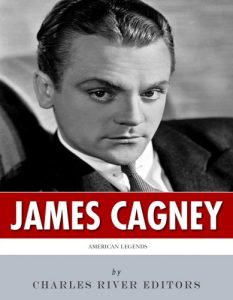*Includes pictures.
*Includes Cagney's own quotes about his life and career.
*Includes a bibliography for further reading.
*Includes a table of contents.
"You don't psych yourself up for these things, you do them...I'm acting for the audience, not for myself, and I do it as directly as I can." – James Cagney
A lot of ink has been spilled covering the lives of history’s most influential figures, but how much of the forest is lost for the trees? In Charles River Editors’ American Legends series, readers can get caught up to speed on the lives of America’s most important men and women in the time it takes to finish a commute, while learning interesting facts long forgotten or never known.
When the American Film Institute assembled its top 100 actors of all time at the close of the 20th century, one of the Top 10 was James Cagney, an actor whose acting and dancing talents spawned a stage and film career that spanned over 5 decades and once compelled Orson Welles to call him "maybe the greatest actor to ever appear in front of a camera." Indeed, his portrayal of “The Man Who Owns Broadway”, George M. Cohan, earned him an Academy Award in the musical Yankee Doodle Dandy, and as famed director Milos Forman once put it, "I think he's some kind of genius. His instinct, it's just unbelievable. I could just stay at home. One of the qualities of a brilliant actor is that things look better on the screen than the set. Jimmy has that quality."
Ultimately, it was portraying tough guys and gangsters in the 1930s that turned Cagney into a massive Hollywood star, and they were the kind of roles he was literally born to play after growing up rough in Manhattan at the turn of the 20th century. In movies like The Public Enemy (which included the infamous “grapefruit scene”) and White Heat, Cagney convincingly played criminals that brought Warner to the forefront of Hollywood and the gangster genre. Cagney also helped pave the way for younger actors in the genre, like Humphrey Bogart, and he was so good that he found himself in danger of being typecast.
While Cagney is no longer remembered as fondly or as well as Bogart, he was also crucial in helping establish the system in which actors worked as independent workers free from the constraints of studios. Refusing to be pushed around, Cagney was constantly involved in contract squabbles with Warner, and he often came out on top, bucking the conventional system that saw studios treat their stars as indentured servants who had to make several films a year.
American Legends: The Life of James Cagney examines the life and career of one of Hollywood’s most iconic actors. Along with pictures of important people, places, and events, you will learn about Cagney like never before, in no time at all.
*Includes Cagney's own quotes about his life and career.
*Includes a bibliography for further reading.
*Includes a table of contents.
"You don't psych yourself up for these things, you do them...I'm acting for the audience, not for myself, and I do it as directly as I can." – James Cagney
A lot of ink has been spilled covering the lives of history’s most influential figures, but how much of the forest is lost for the trees? In Charles River Editors’ American Legends series, readers can get caught up to speed on the lives of America’s most important men and women in the time it takes to finish a commute, while learning interesting facts long forgotten or never known.
When the American Film Institute assembled its top 100 actors of all time at the close of the 20th century, one of the Top 10 was James Cagney, an actor whose acting and dancing talents spawned a stage and film career that spanned over 5 decades and once compelled Orson Welles to call him "maybe the greatest actor to ever appear in front of a camera." Indeed, his portrayal of “The Man Who Owns Broadway”, George M. Cohan, earned him an Academy Award in the musical Yankee Doodle Dandy, and as famed director Milos Forman once put it, "I think he's some kind of genius. His instinct, it's just unbelievable. I could just stay at home. One of the qualities of a brilliant actor is that things look better on the screen than the set. Jimmy has that quality."
Ultimately, it was portraying tough guys and gangsters in the 1930s that turned Cagney into a massive Hollywood star, and they were the kind of roles he was literally born to play after growing up rough in Manhattan at the turn of the 20th century. In movies like The Public Enemy (which included the infamous “grapefruit scene”) and White Heat, Cagney convincingly played criminals that brought Warner to the forefront of Hollywood and the gangster genre. Cagney also helped pave the way for younger actors in the genre, like Humphrey Bogart, and he was so good that he found himself in danger of being typecast.
While Cagney is no longer remembered as fondly or as well as Bogart, he was also crucial in helping establish the system in which actors worked as independent workers free from the constraints of studios. Refusing to be pushed around, Cagney was constantly involved in contract squabbles with Warner, and he often came out on top, bucking the conventional system that saw studios treat their stars as indentured servants who had to make several films a year.
American Legends: The Life of James Cagney examines the life and career of one of Hollywood’s most iconic actors. Along with pictures of important people, places, and events, you will learn about Cagney like never before, in no time at all.






